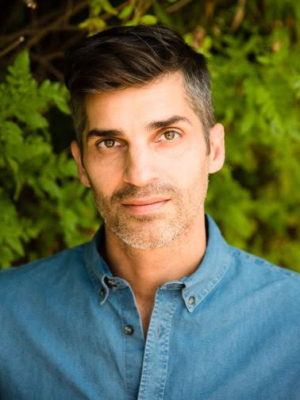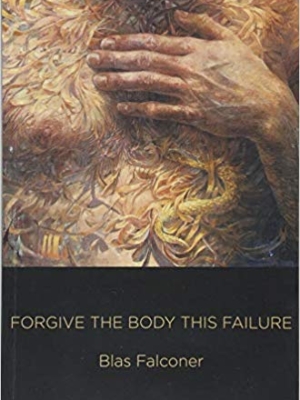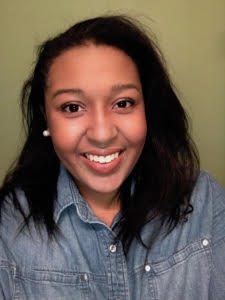Blas Falconer, Poet
 An impressionist painting: From up close, in the throes, the canvas is a blur of colors overlapping, brushstrokes smooth and coarse, repetitive, messy, dizzying, dazzling, dark, and light. But from a distance, the wildness of the expression appears tame. You see the oil painting for what it is: An intricate composition from the paintbrush of a master.
An impressionist painting: From up close, in the throes, the canvas is a blur of colors overlapping, brushstrokes smooth and coarse, repetitive, messy, dizzying, dazzling, dark, and light. But from a distance, the wildness of the expression appears tame. You see the oil painting for what it is: An intricate composition from the paintbrush of a master.
If impressionist painting had a literary match, surely it would be contemporary poetry. After interviewing Blas Falconer, poet, editor, memoirist, and author of Forgive the Body This Failure (2018), I am sure of it. The vibrant immediacy and poignant familiarity one feels looking into the frame of a Monet or a Matisse, finding an ordinary scene of life or nature fresh to the eye? That is the same experience one might have reading a poem by Falconer.
“It isn’t madness but shame for wanting
and shame for not having what I want,which is a kind of madness—drunk,
3 a.m., the stairwell too steep to climb.”—Blas Falconer, “To Orpheus” from A Question of Gravity and Light
Copyright © 2007
Blas Falconer grew up in Virginia. He remembers writing his first poems in middle school. He didn’t write much in high school but did occasionally write what he would now consider prose poems. “I didn’t have a name for the form back then. I started writing poetry more seriously when I was a senior in college. I took a contemporary poetry class, which led to a workshop, and I’ve been writing ever since.”
Falconer’s journey with poetry led to an MFA, a PhD in creative writing and literature, and several poetry collections. Now, Falconer is a creative writing professor at San Diego State University, a lauded poet, and recipient of the 2011 National Endowment for the Arts Fellowship; the Maureen Egen Writers Exchange Award from Poets & Writers; a Tennessee Individual Artist Grant; the New Delta Review Eyster Prize for Poetry; and the Barthelme Fellowship.
Falconer’s poems collage moments, memories, and musings into rhythms that ring like bells. Some sound like postcards to friends or lovers, others like notes passed back through time. Each is vivid and evocative, as though every poem had a heartbeat. What is it, I wondered, that moves a poem to pulse?
“Sometimes, when I’m reading a poem by someone I’ve never met, someone who is no longer alive, someone who maybe has died hundreds, even thousands of years ago, it seems as though I’m being spoken to directly. That intimacy between speaker and reader brings me back to the page again and again,” Blas answered me. Perhaps it is this intimacy that vitalizes the page and turns words in stanzas into a sort of communion of speakers and readers. While technical skill and heartfelt content impress Blas, he’s most moved by poetry that demonstrates the necessary relationship between the two.
Equally, I think the magic of contemporary poetry, like impressionist painting, is movement. A painting composed in a way that allows the viewer to envision a breeze in the underbrush, a tremble at the water’s surface, their own footsteps down a garden path is the same movement that gives a poem its truth.
“Running down the stairwell in the garden,
I divide the steps by three, until my
foot catches the edge, wet with rain, and my
frame, flung forward by its own momentum,leans into the night as if reaching
for something I didn’t know I
wanted.”—Blas Falconer, “Dear Friend” from A Question of Gravity and Light
Copyright © 2007
How is this movement created? When I asked Falconer about his debut poetry collection, he gave me a glimpse into how some of the magic happens.
* * *
 Regan Humphrey: Will you tell me about A Question of Gravity and Light (2007)? What do you love about it?
Regan Humphrey: Will you tell me about A Question of Gravity and Light (2007)? What do you love about it?
Blas Falconer: It took me many years to put this book together. Much of it was written in graduate school, when I was drawn to more traditional forms. There’s a pantoum, a sestina, several sonnets, a prose poem, blank verse. The book didn’t come together, however, until I had a better sense of how the poems spoke to one another. Once I had a better sense of this, I was able to identify an arc for the collection and came to see that several of my poems were redundant. Putting the poems in a collection helped me to push the poems and myself further. What do I love about it? I love how, reading the poems, I can hear my mentor’s voices, their generosity, their patience.
Is the movement in the relationship between the poems themselves? Is the movement carried by the arc of the collection? Or could the movement be a reflection of the many people and experiences that moved the poet to write to begin with? Perhaps the answer is necessarily indiscernible. Perhaps the movement is made by the challenge of creating it.
RH: Fifteen years after writing A Question of Gravity and Light (2007), what about it still resonates with you?
BF: When I read the poems, I see and recall many “a-ha” moments, many breakthroughs, those little epiphanies that I had about poetry and about myself. I remember that writing is an act of discovery.
RH: How do you think that you’ve grown as a poet since then?
BF: Someone once told me that a poet’s first book often reflects their influences most. The second book is a glimpse of the writer wrestling with those early influences. The third book is when the poet begins to truly integrate what they’ve been taught with the poet they are to become. Of course, everyone’s experience is different, but I thought that this was a fitting description for my own trajectory thus far as a writer. Having said that, I continue to be humbled by the page. I still find poetry a mystery.
RH: What do you want from your future as a poet?
BF: I hope to continue writing as a means of discovery, to keep learning, to keep growing in skill and scope.
* * *
Perhaps his discoveries will move us into new relationships with ourselves and the world around us.
“I didn’t understand until, alone,
years later, wandering the city whereI was born, I stood before
a black wall, polished to shimmer,and it looked to me like the sea
at night, hard and endless.”—Blas Falconer, “Orphan” from Poetry (March 2016)
Copyright © 2016
Regan Humphrey is an award-winning writer and MFA candidate at Antioch University Los Angeles, studying Young Adult fiction. She is a writing mentor, film-enthusiast, music-buff, and longtime performer. She holds degrees in marriage & family therapy, cross-cultural relations, and creative arts: writing & performance.





